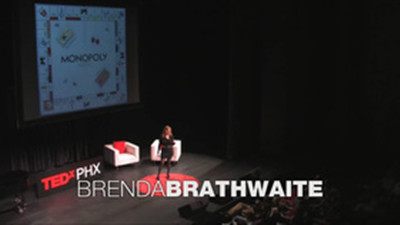And originally it was a math problem more or less.
最初它差不多只是一個數學問題的游戲。
Like, here's the economics of illegal immigration.
就像,關于非法移民的經濟學問題。
And the more I learned about the Mexican culture my partner is Mexican — the more I learned that,
之后,隨著我學到越來越多的墨西哥文化—我的搭檔是墨西哥人—我越來越發現,
you know, for all of us, food is a basic need, but,
你知道,對于我們所有人來說,食物是基本的需求,
and it is obviously with Mexicans too, but it's much more than that.
當然對墨西哥人也是,但對他們來說食物的含義遠不止如此。
It's an expression of love. It's an expression of,God, I'm totally choking up way more than I thought.
食物是愛的表達。它是—上帝,我沒想到我會這么哽咽。
I'll look away from the picture.
我還是先不看這張照片好了。
It's an expression of beauty. It's how they say they love you.
它是美的表達。這是他們表達他們愛你的方式。
It's how they say they care, and you can't hear somebody talk about their Mexican grandmother without saying "food" in the first sentence.
這是他們表達在乎的方式。任何一個墨西哥人談起他的祖母,第一句中一定會有"食物"。
And so to me, this beautiful culture, this beautiful expression is something that I want to capture through games.
對我來說,這種美麗的文化,這種美麗的表達方式,正是我想要通過游戲捕捉的東西。
And so games, for a change, it changes how we see topics,
因此游戲能夠帶來改變,它改變了我們討論主題的方式,
it changes how our perceptions about those people in topics, and it changes ourselves.
它改變了我們對那些主題中人物的看法,它也改變了我們自己。
We change as people through games,
我們通過玩游戲發生改變,
because we're involved, and we're playing,
因為我們既是玩游戲的人,又是游戲的一部分,
and we're learning as we do so. Thank you.
與此同時,我們能學到東西。謝謝。












